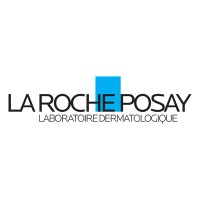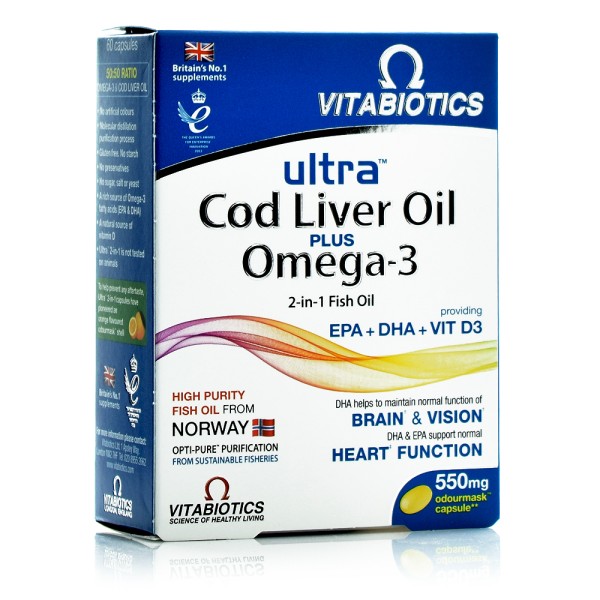Free shipping on orders over 39.00€
Vitabiotics Cod Liver Oil & Ω3 Enriched with Vitamin D3, 60Caps
Fill in your email and you will be informed as soon as we receive the product
Aquamarine 2 in 1 Capsules nutritional supplement by Vitabiotics is a unique formulation with omega-3 fish oil and cod oil in a 1:1 ratio. Omega-3 fish oils are a rich source of the omega-3 essential fatty acids DHA and EPA, while cod oil in addition to omega-3 fatty acids, it provides large amounts of natural vitamins D and A. Omega-3 fatty acids have, according to numerous studies, multiple benefits in many areas of human health. Omega-3s have been shown to help regulate cholesterol and triglyceride levels, maintain elasticity of artery walls and normal blood pressure, so they can contribute to heart health. They also play an important role in brain function and affect behavior and concentration in children and adults. In addition, EPA and DHA have been shown to have anti-inflammatory effects and can contribute to joint health, while DHA is particularly important for eye health, especially the retina. Vitamin D is essential for bone health, while it also plays an important role in skin and immune health. The composition has been enriched with vitamin E, an antioxidant that significantly supports heart, immune and skin health
Composition Features
High purity fish oil & cod oil - Enriched with natural vitamin E
Dosage & Instructions for Use
One or two capsules a day with the main meal, along with a glass of water or cold drink.
Store below 25°C and away from the sun
Caution: if you suffer from food allergies or are allergic to fish and fish products, consult a specialist before using this product
Nutritional Value Two capsules provide: Omega-3 Fish oil 540mg Cod oil 540mg Provides omega-3 fatty acids: EPA (Eicosapentaenoic Acid) DHA (Docosahexaenoic Acid) 116mg 106mg Vitamin D (as D3 48IU) Vitamin E1,2μg 11mg α-TE Contains no Preservatives, artificial colors, starch, gluten, sugar, salt or yeast. Also, it does not contain pharmaceutical substances or hormones
Contains the following ingredients: VITAMIN D DESCRIPTION Vitamin D is produced naturally in the skin through the action of sunlight on cholesterol. Its active form (1,25 dihydroxycholecalciferol) is often classified as a hormone because it acts as a regulator in a manner similar to that of steroid hormones
Vitamin D is measured in μg or iu (1μg = 40i.u.)
STABILITY Vitamin D is stable to normal cooking processes
ACTION Vitamin D is converted in the body to 1,25 dihydroxycholecalciferol, which together with calcitonin and parathormone regulates the concentration of calcium in the blood plasma. This form is classified by many authors as hormones, due to the fact that its mode of action resembles that of steroid hormones. All the functions of vitamin D are related to its "hormonal" action
The main action of vitamin D is to increase the level of calcium in the blood by promoting the absorption of calcium and phosphorus from the intestine, as well as through the release of these minerals from the bones. In order to maintain the normal calcium/phosphorus ratio in the body, vitamin D also increases the excretion of phosphorus, but not calcium, by the kidneys
DEFICIENCY Rickets Lack of vitamin D during childhood leads to the development of rickets. Rickets can appear prematurely as early as two months of age, when the cranial springs remain open and the skull wall is thin (craniotabes). It can also delay the formation of the first teeth and affect standing. Rickets causes widening of the ends of the long bones, resulting in a characteristic curve in the legs when the child begins to walk
Osteomalacia In adults, vitamin D deficiency leads to osteomalacia. This disease is essentially the same as rickets, but its symptoms are slightly different, as the bones no longer grow. Bone thinning and weakening occurs in osteomalacia, and spontaneous fractures can also occur
Osteoporosis and Hip Fracture The incidence of osteoporosis (brittle bones) and hip fracture may increase in postmenopausal women who do not have adequate vitamin D stores
REQUIREMENTS Maximum Safe Level for Daily Supplementation = 10μg Recommended Daily Allowance (RDA) = 5μg BENEFITS OF TAKING A VITAMIN D SUPPLEMENT There are a few categories of people who are theoretically much more likely to be deficient in vitamin D. These people need to take a supplement with this nutrient. These categories include: • Vegetarians and especially vegans (1), because vitamin D is mainly found in animal and dairy products
• Asian women and children who may not be consuming enough vitamin D foods and who choose to cover their skin (2)
• Breastfeeding women whose breast milk may be poor in vitamin D, especially in winter (3)
• Elderly people who are confined to a house and tend to be malnourished (4)
SAFETY There are some reports of hypercalcemia (high blood calcium levels) in children given 50µg (2000i.u.) of vitamin D daily. In adults, symptoms of vitamin D toxicity occur at daily doses of 625μg (25000i.u.). However, it has recently been shown that vitamin D at lower levels (about 1000 iu) can have opposite effects, which are not related to hypercalcemia
INTERACTIONS AND CONTRAINDICATIONS The following list is not complete and any person on medication should consult their doctor before using a vitamin D supplement. • Vitamin D interacts adversely with certain heart medications, such as verapamil (Verapamil)
• Concomitant estrogens may increase blood levels of vitamin D and therefore vitamin D supplements should not be used by people on such medication
• It is thought that vitamin D supplements may increase the activity of anticoagulants, such as warfarin. Although there are conflicting views on this interaction, it would be prudent for people on anticoagulants to avoid vitamin D supplements as a precaution
• Vitamin D should not be taken at the same time as thiazide diuretics, as this combination has been shown to increase blood calcium levels
FOOD SOURCES Food(iu/100g)(mg/100g) Cod liver oil8500212,5 Herring and salted fish896 22,4 Canned salmon50012,5 Evaporated milk1604,0 Eggs651,6 Butter 32 0,8 Liver 32 0,8 Cheddar cheese 12 0,3 1,2 .0,03 Whole milk 00 3 Skimmed milk 3 FISH OIL (OMEGA-3) DESCRIPTION Fish oil is produced from the flesh of fatty fish such as salmon, herring, mackerel, herring (a type of herring), sardine and trout. It is particularly rich in Omega-XNUMX fatty acids EPA (eicosapentaenoic acid) and DHA (docosahexaenoic acid). These fatty acids are converted in the body to the beneficial XNUMX-series prostaglandins. Cod liver oils (cod oils) are made from the liver of white fish, such as cod and halibut. Cod liver oil contains vitamins A and D and should be used with caution by certain people
α-Linolenic acid (ALA) is found in green leafy vegetables, linseed (flax) oil, soybean oil, etc. However, even if our diet is rich in some of them, we may still be deficient in 3-series prostaglandins because the enzymes necessary to convert ALA to EPA are only slightly active
EPA in the diet may therefore be particularly important because it avoids the aforementioned step and supplies material from which series 3 prostaglandins can be readily produced
ACTION The real value of fish oils is found in their EPA and DHA content. The metabolic pathway in which they are involved briefly includes the following steps: α-linolenic acid (ALA) is converted to stearidonic acid (SA) which is converted to docosatetraenoic acid (ETA). ETA is converted to eicosapentaenoic acid (EPA) and this in turn gives either docosapentanoic acid (DPA) or prostaglandins of series 3. DPA is converted to docosahexaenoic acid (DHA)
BENEFITS OF TAKING FISH OIL SUPPLEMENTS
Heart Health Fish oils have been shown to have significant benefits for heart health, including the following: • Positively affects the balance of blood fats (1)
• Reduces the chance of blood clotting (2)
• Makes the heart less prone to arrhythmias (irregular beats) (3)
• Reduces blood viscosity and therefore facilitates its flow (4)
Fish oil may also help prevent heart disease by increasing good HDL cholesterol, lowering homocysteine levels, and reducing hypertension (5-14).
Pregnancy Pregnant women are advised to maintain a high intake of Omega-3 fatty acids by consuming fish oils or using, if necessary, supplements with a low level of fish oil. This is suggested because more and more studies show that Omega-3 fatty acids are vital for fetal brain development (15).
Arthritis Improvement in rheumatoid arthritis symptoms has been reported in patients taking fish oil supplements (16-18). Fish oil treatment has no side effects and can improve the effects of conventional drugs (19)
Menstrual Symptoms Regular use of fish oil may benefit women who experience menstrual cramps (20)
Bipolar Illness A recent study showed significant beneficial effects in patients with bipolar illness (a manic-depressive psychosis) (21).
Osteoporosis The essential fatty acids found in fish oil may help treat osteoporosis when taken in conjunction with calcium supplements. Studies have shown that women who take fish oil in combination with calcium have better bone density and fewer fractures than women who take calcium alone (22,23).
SAFETY Fish oil has been used in very high amounts during clinical studies without any apparent symptoms of toxicity. However, when patients take high levels of fish oil, they should be closely monitored by a specialist because Omega-3 fatty acids can replace Omega-6 fatty acids in cell membranes. Thinning of the blood and a decrease in clotting time may also occur
When taking cod liver oil, it is very important that the dosages of vitamins A and D are controlled to ensure that neither exceeds the upper safety level. This must be done because these vitamins are fat-soluble, which means that fish oil increases the possibility of eventually having too much of them in the body. When pregnant women take cod oil, they should not take more than 2500i.u. of vitamin A daily, while the rest of the people should not exceed 7500i.u. Consumption of vitamin D through supplements should not exceed 10μg
INTERACTIONS AND CONTRAINDICATIONS
Evening Primrose Oil A fish oil supplement can be used at the same time as an evening primrose oil supplement in order to achieve a balance between the two families of fatty acids (Omega-3 and Omega-6) they contain. However, the combination of α-linolenic acid (ALA) and γ-linolenic acid/linoleic acid (GLA/LA) is contradictory, as the former prevents further conversion of the latter two
Nausea Fish oils may occasionally cause nausea when first taken. This symptom subsides in a short time and may be reduced if fish oils are taken with a meal
Warfarin High doses of fish oils should be avoided by people taking anticoagulants such as warfarin and heparin.
EAN: 5021265222551














